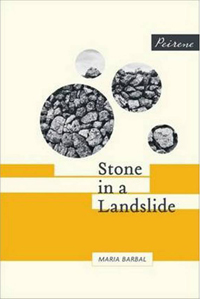If nothing comes near, I’ll be here, still

Stone in a Landslide
by Maria Barbal
translated from Catalan by Laura McGloughlin and Paul Mitchell
This book takes a whole life and tells it in less than 120 pages, which is both its strength and its weakness. There is some beautiful writing, but there’s also a lot of speeding past things that another writer might have taken a whole novel to explore. It feels like a bit of a missed opportunity.
The life told is that of Conxa, a poor Catalan woman whose story begins when she is a child in the early 20th century. There are three major things that happen in her life that each could have been central to a chunky novel but here are dealt with in 10 or 15 pages. First, she is from a large rural family that can’t easily support all the children, while her aunt and uncle are childless and need help to manage their house and land, so at 13 Conxa is sent on a day’s journey, the furthest she has ever travelled, to begin a new life at her aunt’s house. She has gone from countryside to small town, from familiar to unfamiliar and it takes years for her to settle in.
“My mother was a woman who knew only two things: how to work and how to save…She was always the last to go to bed and sometimes she’d say a rosary. But for all her devotion, I’m sure she didn’t even get to half a mystery. Her tiredness must have held her trapped, like a sparrow in a snare.”
Perhaps the biggest thing, from Conxa’s perspective, is her falling in love with Jaume. He’s a builder and carpenter who travels a lot for his work, and consequently is much more worldly and politically aware then Conxa, who shies away from such things. I found it difficult to sympathise with Conxa’s lack of interest in the wider world, even though the story is narrated by her voice, so we hear her reasons first hand. It keeps the story very narrow, telling just her life rather than the history of the world or Spain or even just Catalonia at that time, which I can see has its advantages, but it’s not the perspective I would prefer to read.
The final major event for Conxa is the Spanish Civil War. While the First World War appears to have happened without even a hint of it in Conxa’s narrative, the Spanish Civil War is unavoidable. Jaume’s interest in politics makes his absences from home suspicious and it’s little surprise when terror comes to their doorstep. But still Conxa never offers explanation or her own opinion, only fear.
“I feel like a stone after a landslide. If someone or something stirs it, I’ll come tumbling down with the others. If nothing comes near, I’ll be here, still, for days and days.”
Weaving between and around these three is the everyday life of sustenance farming and village gossip. And none of these are things that lack interest, or told badly, only too briefly to really make me feel involved. I usually like spare prose but I think this was too much of an extreme and I just wanted there to be more to it.
Pedra de Tartera published 1985 by Columna Edicions.
This translation published 2010 by Peirene Press.
Source: Bought direct from the publisher.